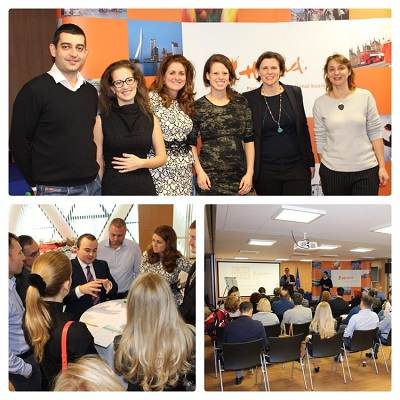The First #FarmHack Event in Bulgaria
Farmers from various agricultural sectors, processors, traders, experts, scientists, analysts, IT specialists and representatives of institutions gathered for the first time to look for general solutions to problems in the agro-food chain. The initiative, organized by the Embassy of the Kingdom of the Netherlands in partnership with InteliAgro, Smart AgroStart and the Institute for Agrostrategies and Innovation, was held on 14th November at the House of Europe in Sofia.

In recent years much has been said about the potential of introducing high technologies in agriculture. They facilitate the management of operations in farms and contribute to better utilization of resources. However, the farmers themselves, especially in our country, still have many questions that have no answers, such as how new technologies will solve their problems in practice, how they will use them, how to build data infrastructure and, subsequently, how to process and use these data in the best possible way.
The aim of the first undertaking of its kind in the agricultural sector was to provide an answer to these questions, identifying particular problems which the specialists that had gathers to solve. The event was led by Anne Bruinsma and Lieke Brochorst, representatives of FarmHack.nl, the Netherlands. The company has experience in the organization of interactive events aimed at finding technological solutions to problems that participants in the agro-food chain face. The following topics were discussed by the operational groups formed of the participants at the forum in Sofia:
- An alternative to the conventional treatment of crop production with the purpose of decreasing the cost price and increasing the efficiency of farms. Introduction of an electronic system, based on weather stations, sensors and technologies for precision agriculture allowing for optimization of the resources used;
- Improvement of the model of web-based shortened supply chains. Introduction of a rating system and personal profiles of suppliers and consumers, geographic localization and a possibility to include more useful information for consumers on the National exchange website;
- A model for tracing foods of animal origin that will ensure the informed choice of consumers and add value to farms. The model will enable the identification of the origin of the product, the way of breeding, the raw materials used in production and the quality parameters along the whole chain from the farm to the store;
- Development of a model for phase III composting in mushroom cultivation, which will increase productivity of farms by up to 40%;
- Determination of soil quality characteristics and its enrichment with bioagents with the purpose of improving the efficiency of small mountain farms;
The developed innovative models will be thoroughly investigated in order to assess which of them have the potential to be put for solving at the next event in 2018, that can be held in the format of Hackathon* or Tech Safari**.
Another topic discussed was the funding for implementation of such innovative projects and the opportunities that measure 16.1. of the Rural Development Programme will provide were presented. The measure is expected to start in spring next year. A topic that was not missed was the need of private funding of such ideas as an only guarantee for their market applicability and realization.
*Hackathon – an event which has usual duration of several days, where a great number of people meet to solve various problems through computer programming.
**Tech Safari – an exchange visit between farmers and IT specialists so that every one of them can become familiar with the needs and capabilities of the other. Usually, farmers visit high-tech companies, and IT and other technology specialists visit agricultural holdings.
Source: http://inteliagro.bg/article/228/Pyrviqt-Farmhack-v-Bulgaria